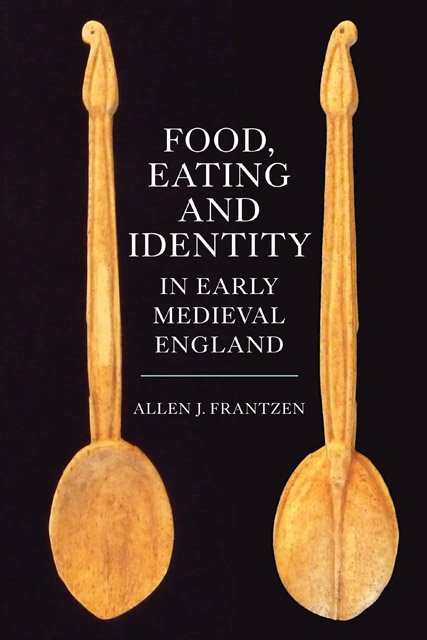2 - Food Knowledge: Texts, Feasts, and Objects
Published online by Cambridge University Press: 14 February 2023
Summary
Picturing food: pyramids and networks
Everyone who has read Old English literature knows about Cædmon and his gift of song. The cowherd of Whitby abandoned a feast at which he was about to be called on to sing, retired to watch the cattle, and in his sleep was visited by a messenger who commanded him to sing, which Cædmon then did. This remarkable event, seen as the invention of Christian poetry in English, took place because Cædmon declined to sing at the gebeorscipe, a “carousal” according to the Dictionary of Old English, or what Bede, in the Ecclesiastical History, calls a convivium, a feast. He went “to the cattle byre,” where “it was his turn to take charge of [the animals] that night” (ad stabula iumentorum, quorum ei custodia nocte illa erat delegata). Duty paired with shyness to motivate self-imposed exile.
Stephen Pollington defines a gebeorscipe as a “drinking party” and contrasts it to the symbel, a “heavily symbolic” event, and to other words for “high-status feasting.” This distinction might not be so clear, however. Bede elsewhere uses convivium to describe a celebration in a village. A visitor arrives there, and, according to the translator of the Old English version of the Ecclesiastical History, finds that “all the hamlet was assembled for a feast” (þæt ham eall to symble gesomnad wæs). Those participating in this symbel readily welcome the stranger; they do not sound at all like aristocrats caught up in formalities. Bede himself associates Cædmon with the symbel when saying that, when it was his turn to sing, “he then arose out of shame from the feast and went home to his house” (þonne aras he for forscome from þæm symble & ham eode to his huse). The translator seems to have treated the symbel and the gebeorscipe as interchangeable. If so, we should consider the possibility that Cædmon’s feast was not the only celebration at Whitby that night. If it were a feast day, monks and nuns would have gathered not too far away to celebrate as well. Around one table the men and women feasted on simple food from simple vessels and drank beer. Abbess Hild and her peers enjoyed wine and food removed by many stages from its point of origin, just as their tableware, some of which no doubt was imported, was far from its place of manufacture.
- Type
- Chapter
- Information
- Food, Eating and Identity in Early Medieval England , pp. 34 - 58Publisher: Boydell & BrewerPrint publication year: 2014

